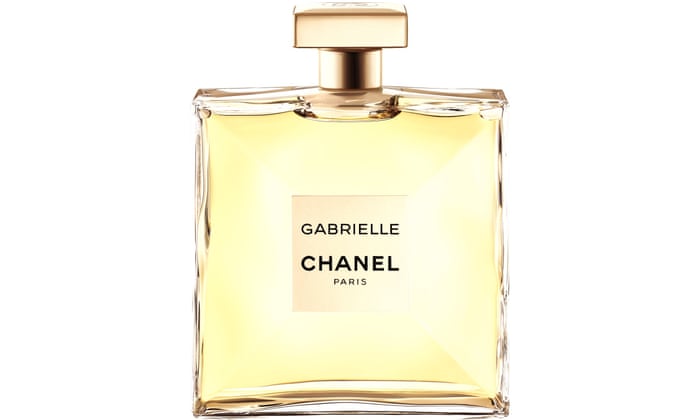
Chanel’s new Gabrielle fragrance, which starts at £79 for 50ml. Photograph: Chanel
There is likely to be a very heady aroma floating across the nation’s beauty halls this weekend as a small army of shop assistants mobilises to spray shoppers with Gabrielle – Chanel’s first new perfume in 15 years.
The perfume industry’s equivalent of a new blockbuster movie, the hype has been building for months, and peaked this week with the release of an ad featuring the actress Kristen Stewart dancing her way into a wall of Gabrielle bottles.
Chanel is putting its considerable financial muscle behind the new brand at a time when the UK perfume market – along with key European markets – is in the doldrums. The number of bottles sold is falling by between 5%-10% a year as millennials turn their nose up at traditional scents.
Perfume sales put £1.5bn a year into the tills of UK retailers but in recent years growth has only been maintained by manufacturers hiking prices and well-heeled shoppers trading up to expensive products like Creed aftershave, which costs more than £100 for a 30ml bottle, and Gabrielle, which starts at £79 for 50ml.
“We think this will be one of the biggest launches in our 25-year history,” says Gill Smith, the managing director of the The Perfume Shop, the UK’s biggest specialist retailer. “Chanel has a universal appeal and we know our customers love the interlocking C’s. It’s also pay day this weekend so lots of people will see it and want to buy it.”
The Mintel analyst Roshida Khanom says specialist chains and department store counters have been having a tough time selling scents. Savvy shoppers sniff testers in store and then scour the web for the best price. Perfume is also having to battle for consumers’ cash at a time when Britons are spending more of their spare money on experiences.
Most perfumes are made under contract by beauty conglomerates such as Estée Lauder and L’Oréal but at the top end, luxury goods companies such as Hermès and Chanel continue to make their own. A big problem area is the mass market, where manufacturers are struggling to replace dwindling sales of celebrity fragrances, which have fallen out of favour.
“The celebrity fragrance is not as aspirational as it once,” says Khanom. “Celebrities have become more accessible; we see the good, bad and the ugly on social media.”
Sanjay Vadera, who runs the 183-store chain The Fragrance Shop, said sales of celebrity fragrances have slumped more than 10% in the last year. In their place has come a new breed of brands linked to fashion stores, such as Babe Power, the first perfume from the online fashion retailer Missguided, which has been among the year’s biggest sellers to date.
The boom in celebrity perfumes ranged from movie and music stars such as Elizabeth Taylor (White Diamonds), Jennifer Lopez (Glow), Beyoncé (Heat) and Britney Spears (Fantasy, Curious), to footballer fragrances such as David Beckham (Instinct, Intimately). Some of the brands have had surprising longevity, including the late Jade Goody’s Shh! and Controversial.
“Britney Spears launched 10 years ago but it still sells because it’s a good juice,” says Vadera. “Jade Goody still sells because of the price. They are not buying it because of Jade Goody but because the juice is very good value at £10 and they are getting it in a nice bottle. At the end of the day it is about product and value.”
Vadera says the UK perfume market has seen low single digit growth, in value terms, over the last few years but after inflation is stripped out the underlying picture is one of flat or falling sales – although The Fragrance Shop has continued to perform strongly as it cashes in on demand for big ticket scents such as Dior Sauvage. “It’s been more of a slack market than anything else,” he said.
But the buzz around Gabrielle, as well as a slew of other new perfumes, including Jean Paul Gaultier’s Scandal and Bloom from Gucci, means perfume retailers are hoping for a lucrative Christmas period. “We’ve not seen a lineup like this for a long time,” says Vadera.
But with perfume sales also falling in key luxury markets such as France and Italy, the industry has begun to ring the changes. The use of Stewart by Chanel suggests a willingness to drop some of the romantic boy-meets-girl cliches it has been using to sell perfume since Gabrielle “Coco” Chanel launched No5 in the 1920s.
Marketing budgets are also being deployed to buy social media promotions rather than space in department store windows as shopping habits change.
The cut-throat nature of the perfume industry means that despite months of hype around Gabrielle in the fashion press, what it actually smells like was left to remain a mystery until the first bottles were opened in stores.
With characteristic fashion industry hyperbole, Chanel describes the smell as a “solar vibration”.
Smith, who had to sign a non-disclosure agreement to sniff a Gabrielle tester six months ago, offered a rather more down-to-earth description: floral and quite fresh with an air of French chic.
